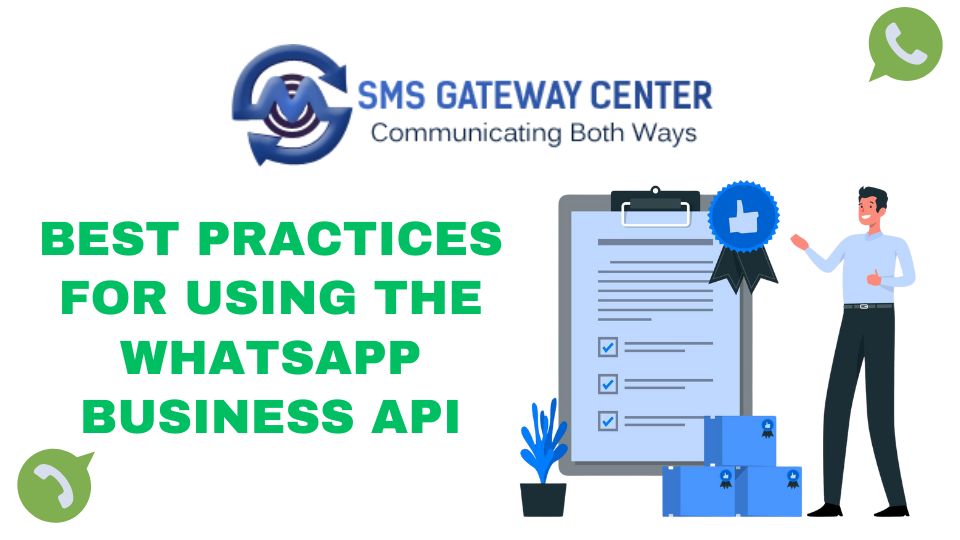Best Practices for Using the WhatsApp Business API
The WhatsApp Business API is a powerful tool that businesses can use to connect with their customers in a more personalized and engaging way. However, to use this tool effectively, businesses need to follow best practices that will help them maximize the benefits of the WhatsApp Business API. In this article, we’ll explore some of the best practices for using the WhatsApp Business API.

- Ensure Compliance with WhatsApp Policies
WhatsApp has strict policies in place that govern the use of its platform. Businesses need to ensure that they comply with these policies to avoid penalties or account suspension.
WhatsApp’s policies include rules around the types of messages that can be sent, the frequency of messages, and the use of messaging templates. Businesses should familiarize themselves with these policies and ensure that their messaging campaigns comply with them.
- Develop a Clear Messaging Strategy
To use the WhatsApp Business API effectively, businesses need to develop a clear messaging strategy that aligns with their business goals. This includes deciding on the types of messages that will be sent, the frequency of messages, and the tone and style of messaging.
Businesses should also consider the different types of messaging campaigns they can use on WhatsApp, such as appointment reminders, shipping updates, and customer support.
Additionally, businesses should ensure that their messaging campaigns are tailored to the preferences of their target audience. This includes understanding the preferred messaging channels of their customers, the time of day they are most likely to engage with messaging, and the type of content that resonates with them.
- Use Messaging Templates
Messaging templates are pre-approved message formats that businesses can use to send messages on the WhatsApp Business API. These templates ensure that messages are compliant with WhatsApp’s policies and reduce the likelihood of account suspension.
Businesses should use messaging templates whenever possible to ensure that their messaging campaigns are compliant with WhatsApp’s policies. Additionally, businesses should ensure that their messaging templates are tailored to their specific messaging needs and the preferences of their target audience.
- Optimize Messaging Content
To maximize the effectiveness of messaging campaigns on the WhatsApp Business API, businesses should optimize their messaging content. This includes crafting messaging content that is engaging, informative, and relevant to their target audience.
Additionally, businesses should consider using multimedia elements such as images, videos, and audio messages to enhance the impact of their messaging campaigns.
- Provide Prompt Customer Support
One of the key advantages of the WhatsApp Business API is the ability to provide prompt customer support. To provide effective customer support, businesses should ensure that they have a system in place to handle customer inquiries and respond in a timely manner.
Businesses can use chatbots to handle common customer inquiries and automate responses. Additionally, businesses should have a team in place to handle more complex inquiries and provide personalized support.
By providing excellent customer support on WhatsApp, businesses can improve customer satisfaction, build stronger customer relationships, and drive growth.
- Analyse and Optimize Metrics
To ensure that messaging campaigns on the WhatsApp Business API are effective, businesses need to analyze and optimize metrics such as message delivery rate, open rate, response rate, and conversion rate.
By analyzing these metrics, businesses can gain insights into the effectiveness of their messaging campaigns and identify areas for improvement. Based on these insights, businesses can optimize their messaging campaigns to improve their effectiveness.
- Ensure Compliance with Data Privacy Regulations
As with any business tool that involves the handling of customer data, businesses need to ensure that their use of the WhatsApp Business API is compliant with data privacy regulations such as GDPR and CCPA.
Businesses should work with their Business Solution Provider to ensure that their use of the WhatsApp Business API is compliant with data privacy regulations. Additionally, businesses should have a system in place to handle customer data securely and in compliance with data privacy regulations.
In conclusion, the WhatsApp Business API is a powerful tool that businesses can use to connect with their customers in a more personalized and engaging way. To use this tool effectively, businesses need to follow best practices that ensure compliance with WhatsApp’s policies, develop a clear messaging strategy, use messaging templates, optimize messaging content, provide prompt customer support, analyse and optimize metrics, and ensure compliance with data privacy regulations. By following these best practices, businesses can maximize the benefits of the WhatsApp Business API and drive growth.

